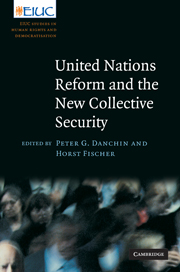Book contents
- Frontmatter
- Contents
- List of contributors
- Series editors' preface
- Preface
- List of abbreviations
- Introduction: the new collective security
- PART I Law and politics in United Nations reform
- PART II Defining “threats” to collective security
- PART III Prevention and responses
- 7 On the far side of conflict: the UN Peacebuilding Commission as optical illusion
- 8 The new peacebuilding architecture: an institutional innovation of the United Nations
- 9 The World Summit process and UN sanctions reform: between rhetoric and force
- 10 The UN response to the evolving threat of global terrorism: institutional reform, rivalry, or renewal?
- 11 International justice and collective security: between pragmatism and principle
- PART IV Perspectives on the ground
- Bibliography
- Index
11 - International justice and collective security: between pragmatism and principle
from PART III - Prevention and responses
Published online by Cambridge University Press: 05 May 2010
- Frontmatter
- Contents
- List of contributors
- Series editors' preface
- Preface
- List of abbreviations
- Introduction: the new collective security
- PART I Law and politics in United Nations reform
- PART II Defining “threats” to collective security
- PART III Prevention and responses
- 7 On the far side of conflict: the UN Peacebuilding Commission as optical illusion
- 8 The new peacebuilding architecture: an institutional innovation of the United Nations
- 9 The World Summit process and UN sanctions reform: between rhetoric and force
- 10 The UN response to the evolving threat of global terrorism: institutional reform, rivalry, or renewal?
- 11 International justice and collective security: between pragmatism and principle
- PART IV Perspectives on the ground
- Bibliography
- Index
Summary
Some years ago, a prominent international scholar stated that “the administration of justice in the Community of States [would] not be complete until a criminal jurisdiction is established to cope with international crimes” and that the “necessity of such a jurisdiction [seemed] to be a fact established without reasonable doubt.”
At the time it was published in 1980, this quote was seen as an expression of idealistic fervor. In the 1980s, and even in the 1990s, the establishment of a permanent international criminal court seemed a long way off, if not impossible. However, international criminal prosecution of serious crimes, such as genocide, crimes against humanity, and war crimes, experienced unprecedented development during the 1990s. The establishment of the ad hoc international criminal tribunals for Rwanda and the former Yugoslavia proved to be an important catalyst because it forced the prospect of a permanent court back onto the international agenda. Once this happened, progress was astonishingly swift. Just over five years after the establishment of the International Criminal Tribunal for the former Yugoslavia, 120 nations voted to adopt the Rome Statute of the International Criminal Court (ICC) on July 17, 1998, a date that symbolically coincided with the fiftieth anniversary of the adoption of both the Convention for the Prevention and Sanction of the Crime of Genocide and the Universal Declaration of Human Rights, two instruments that recognized protection of human rights as the best means for safeguarding peace and security.
- Type
- Chapter
- Information
- United Nations Reform and the New Collective Security , pp. 282 - 310Publisher: Cambridge University PressPrint publication year: 2010
- 1
- Cited by



